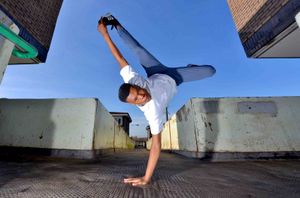A J dreams of breaking into the Olympics
A teenager is hoping to break his way into the Olympics after hearing that breakdance is to be one of the sports at the 2024 Paris Games.

Aijion Brown, 19, from Wolverhampton, who is better known as A J The Cypher Cat on the dancing circuit, is one of the UK's top performers in the dance form, which originated in New York in the early 1970s.
The International Olympic Committee this week announced that breakdancing – or breaking as it is often called – will be included in the list of sports represented at the Games in Paris.
"It's made me really happy," says A J, who is studying graphic design at Birmingham City University.
"I've been dancing since I was five years old, and I've always had the dream that breaking would be able to provide me with a job.
"I'm now going to do everything I can to get the chance to represent my country."
With plenty of international titles under his belt, he stands a fair chance. In March this year he reached the semi final of the Red Bull BC One UK contest in London.
"That's the biggest contest outside the Olympics, and I've done that," he says.
"The last battle I went to was Break Mission a couple of months ago in Birmingham. It's an international competition, and people came to Birmingham from all over the world.
"Because of Covid, only the top 16 competitors got to it, normally there would be double that number."
In recent years A J, who lives on the Park Village estate, has also held the British Kids junior title and was UDO World Champion.
It will fall to Dance Sport England, which has traditionally represented ballroom and Latin dancing, to oversee the search for the best breakdancers to represent Team GB in Paris.
Jane Jones, of Dance Sport England, says the organisation is very excited that breaking had been formally accepted into the Olympic movement.
She says the domestic breakdance scene is bigger than many people realise and full of very talented and extremely athletic competitors.
Team GB did not send any breaking competitors to the Youth Olympics in 2018 but the British Olympic Association and UK Sport, which provides funding for elite Olympic and Paralympic sport, is now in the process of formulating a plan. There is a British Breaking League which has organised more than 25 events over the past three years and has particularly focused on building the sport among Under-16s.
Some have questioned whether it really is a sport, particularly as it will replacing karate and baseball at the 2024 Games, both of which are due to appear at the postponed Tokyo games next year. Australian squash legend Michelle Martin accused the IOC of making a mockery of the Olympics by overlooking her sport once more.
"You just look at the whole thing and you just go ‘where’s the Olympics going?’," she says. "I know some people say breakdancing’s a sport but I don’t understand."
A J is adamant that it is a sport.
"It's very competitive, and you have to work up a lot to build up the muscles and the body strength," he says.
A J says he typically spends two-to-three hours a day in training, working both on his technique and on building up his strength and fitness.
"Sometimes I will be doing push-ups and making sure I have still got my strength, and that can take maybe two hours a day, but if in training I'm practising my routines and my combos, that can be an hour."
While results depend on the opinions of the judges, breakdancing also has a league structure which not unlike that of football, cricket or rugby.
Competitors go head to head in one-on-one 'battles', with the winner being awarded up to 15 points.
"If you keep winning you get more and more points," says A J.
“It’s a bit like gymnastics, but with a competitive edge.
“Then the top dancers get through to the final of the competition, and then it goes to knockout. Say, you’re number one, and I’m number eight, I can then challenge you to a battle for your place.”





